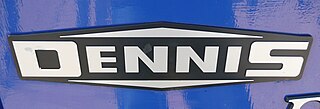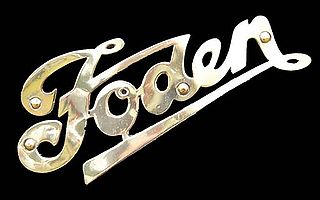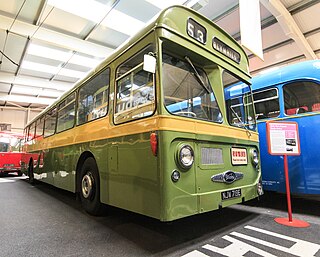
Leyland Motors Limited was an English vehicle manufacturer of lorries, buses and trolleybuses. The company diversified into car manufacturing with its acquisitions of Triumph and Rover in 1960 and 1967, respectively. It gave its name to the British Leyland Motor Corporation, formed when it merged with British Motor Holdings in 1968, to become British Leyland after being nationalised. British Leyland later changed its name to simply BL, then in 1986 to Rover Group.

Commer was a British manufacturer of commercial and military vehicles from 1905 until 1979. Commer vehicles included car-derived vans, light vans, medium to heavy commercial trucks, and buses. The company also designed and built some of its own diesel engines for its heavy commercial vehicles.

Dennis Specialist Vehicles was an English manufacturer of commercial vehicles based in Guildford, building buses, fire engines, lorries (trucks) and municipal vehicles such as dustcarts. All vehicles were made to order to the customer's requirements and more strongly built than mass production equivalents. For most of the 20th century the Dennis company was Guildford's main employer.

Sterling Trucks Corporation was an American truck manufacturer. Founded in 1998, Sterling was created following the 1997 acquisition of the heavy-truck product lines of Ford Motor Company by Freightliner. Taking its nameplate from a long-defunct truck manufacturer, Sterling was slotted between Freightliner and Western Star within the Daimler product range.

Associated Equipment Company (AEC) was a British vehicle manufacturer that built buses, motorcoaches and trucks from 1912 until 1979. The name Associated Equipment Company was hardly ever used; instead, it traded under the AEC and ACLO brands. During World War One, AEC was the most prolific British lorry manufacturer, after building London's buses before the war.

Avia Motors s.r.o. is a Czech automotive manufacturer. Founded in 1919 as an aircraft maker, it diversified into trucks after 1945. As an aircraft maker it was notable for producing biplane fighter aircraft, especially the B-534. Avia ceased aircraft production in 1963.

Seddon Atkinson Vehicles Limited, was a manufacturer of large goods vehicles based in Oldham, Greater Manchester, England, was formed after the acquisition in 1970 of Atkinson Vehicles Limited of Preston by Seddon Diesel Vehicles Limited of Oldham. In 1974, the firm was acquired by International Harvester, which sold it in March 1984 to the Spanish group Enasa which made it a subsidiary of Pegaso. In 1990, it became part of Iveco which used the brand for various types of specialised vehicles in the United Kingdom. The range of models produced included EuroMover, Pacer and Strato, which are aimed at refuse collection, recycling and construction operators.
Scammell Lorries Limited was a British manufacturer of trucks, particularly specialist and military off-highway vehicles, between 1921 and 1988. From 1955 Scammell was part of Leyland Motors.

Foden Trucks was a British truck and bus manufacturing company, which had its origins in Elworth near Sandbach in 1856. Paccar acquired the company in 1980, and ceased to use the marque name in 2006.
Bedford Vehicles, usually shortened to just Bedford, was a brand of vehicle manufactured by Vauxhall Motors, then a subsidiary of multinational corporation General Motors. Established in April 1931, Bedford Vehicles was set up to build commercial vehicles. The company was a leading international lorry brand, with substantial export sales of light, medium, and heavy lorries throughout the world.

Guy Motors was a Wolverhampton-based vehicle manufacturer that produced cars, lorries, buses and trolleybuses. The company was founded by Sydney S. Guy (1885–1971) who was born in Kings Heath, Birmingham. Guy Motors operated out of its Fallings Park factory from 1914 to 1982, playing an important role in the development of the British motor industry.
Leyland Trucks is a medium- and heavy-duty truck manufacturer based in Leyland, Lancashire, United Kingdom. It can trace its origins back to the original Leyland Motors, which was founded in 1896, and subsequently evolved into British Leyland. After British Leyland became the Rover Group in 1986, the truck business was spun off and merged with DAF Trucks to form DAF NV, which operated as Leyland DAF in the UK.

The Chevrolet Kodiak and GMC TopKick are a range of medium-duty trucks that were produced by the Chevrolet and GMC divisions of General Motors from 1980 to 2009. Introduced as a variant of the medium-duty C/K truck line, three generations were produced. Slotted between the C/K trucks and the GMC Brigadier Class 8 conventional, the Kodiak/TopKick were developed as a basis for vocationally oriented trucks, including cargo haulers, dump trucks, and similar vehicles; on later generations, both cutaway and cowled-chassis variants were produced for bus use.

The Ford Transcontinental is a heavy goods vehicle tractor and rigid unit that was manufactured between 1975 and 1984 by Ford Europe in the Netherlands and Britain. A total of 8735 units were produced, 8231 in Amsterdam and another 504 at the Foden VAP in Sandbach, Cheshire UK.

Bristol Commercial Vehicles was a vehicle manufacturer located in Bristol, England. Most production was of buses but trucks and railbus chassis were also built.

A steam wagon is a steam-powered truck for carrying freight. It was the earliest form of lorry (truck) and came in two basic forms: overtype and undertype, the distinction being the position of the engine relative to the boiler. Manufacturers tended to concentrate on one form or the other.

Western Star Trucks Sales, Inc. is an American truck manufacturer headquartered in Portland, Oregon, and a subsidiary of Daimler Truck North America, which is an independent subsidiary of the multinational Daimler Truck. Western Star trucks are commonly sold at Freightliner dealerships.

The Daimler Roadliner was a single-decker bus and coach chassis built by Daimler between 1962 and 1972. Notoriously unreliable, it topped the 1993 poll by readers of Classic Bus as the worst bus type ever, beating the Guy Wulfrunian into second place. It was very technologically advanced, offering step-free access some 20 years before other buses; as a coach, it was felt by industry commentators to be in advance of contemporary UK designs.

MAN Truck & Bus SE is a subsidiary of Traton, and one of the leading international providers of commercial vehicles. Headquartered in Munich, Germany, MAN Truck & Bus produces vans in the range from 3.0 to 5.5 t gvw, trucks in the range from 7.49 to 44 t gvw, heavy goods vehicles up to 250 t road train gvw, bus-chassis, coaches, interurban coaches, and city buses. MAN Truck & Bus also produces diesel and natural-gas engines. The MAN acronym originally stood for Maschinenfabrik Augsburg-Nürnberg AG, formerly MAN AG.

The Freightliner Business Class M2 is a model range of medium-duty trucks produced by Freightliner since the 2003 model year. The first generation of the Business Class developed entirely by Freightliner, the M2 replaced the FL-Series introduced in 1991. Serving as a Class 5-Class 8 product range, the M2 competes primarily against the International MV and the Ford F-650/F-750 Super Duty.






















